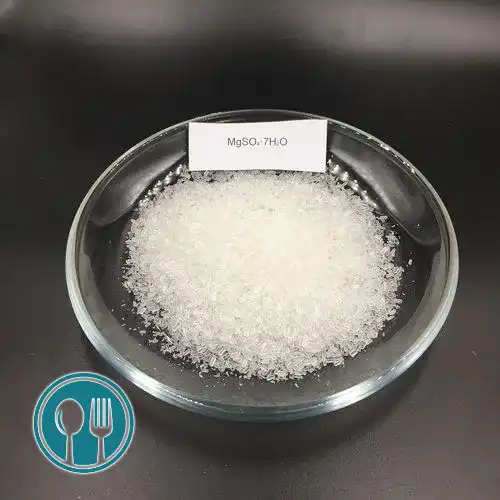Hebei Messi Biology Co., Ltd. stated that not all mineral water contains magnesium sulfate. Only sulfate mineral water will add magnesium sulfate. The functions and effects of magnesium sulfate include replenishing water, accelerating body metabolism, maintaining electrolyte balance, promoting intestinal peristalsis, anti-inflammatory and antibacterial, etc.
1, Replenish moisture: Magnesium sulfate is a common mineral in mineral water. Its main function is to provide moisture and maintain the body’s normal physiological needs for fluids.
2, Accelerate body metabolism: Adding magnesium sulfate to mineral water speeds up the metabolism of water in the body, helps the body’s metabolic substances to be excreted from the body, and has the effect of promoting basal metabolic circulation.
3, Maintain electrolyte balance: Magnesium ions are a mineral needed by the body to maintain the permeability of blood vessel walls, normal physiological activities of muscles and nerves. Daily drinking of mineral water containing magnesium sulfate can supplement magnesium ions to maintain electrolyte balance in the body.
4, Promote intestinal peristalsis: Magnesium sulfate is a magnesium salt that is difficult to absorb in the small intestine, prevents water intake from the intestinal wall, increases intestinal content, accelerates peristalsis, and has a cathartic effect. Daily drinking of mineral water containing magnesium sulfate in moderation can promote intestinal peristalsis and relieve constipation.
5, Anti-inflammatory and antibacterial: Magnesium sulfate dissolves when exposed to water and decomposes into magnesium ions and sulfate ions. Magnesium ions have anti-inflammatory and analgesic effects, and sulfate ions have the function of regulating osmotic pressure. During intestinal infection, you can follow the doctor’s advice and drink an appropriate amount of mineral water containing magnesium sulfate to inhibit the proliferation of intestinal flora and relieve discomfort.
Magnesium sulfate usually refers to magnesium sulfate heptahydrate crystals, and there are also anhydrous magnesium sulfate powder. There are two main preparation methods: one is to react with sulfuric acid and magnesium-containing ores such as magnesite; the other is to make it from Prepared from sea and lake bitter brine. Magnesium sulfate heptahydrate is an important inorganic chemical product with a wide range of uses.
In medicine, it is used to prepare protective ointments, laxatives, analgesics, and antidotes, and can be processed into anticonvulsants, leucomycin, acetylspiramycin, creatinine, magnesium trisilicate, griseofulvin, and salts. Mycomycin, mycocin, tobramycin, Shenyankang, gibberellin, capromycin sulfate, etc.; in the microbial industry, used as culture medium components, additives for brewing, and nutrient sources during fermentation;
In light industry, it is used as a stabilizer for dicalcium phosphate in the production of fresh yeast, monosodium glutamate, beverages, mineral water, health salt, sea crystal, bath health, beer and toothpaste; in food additives, it is used as a nutritional supplement, solidifying agent Agents, flavor enhancers, and processing aids; in the chemical industry, used to manufacture magnesium salts such as magnesium stearate, magnesium hydrogen phosphate, and magnesium oxide, and sulfates such as potassium sulfate and sodium sulfate.

